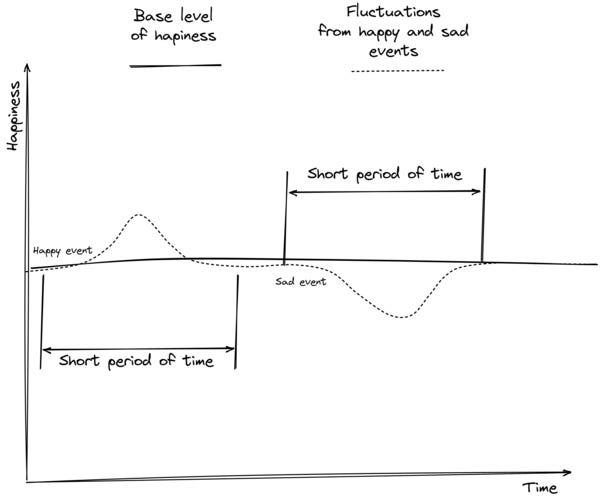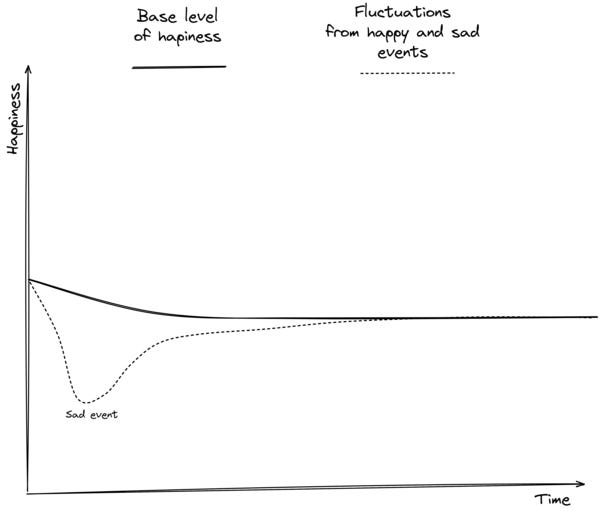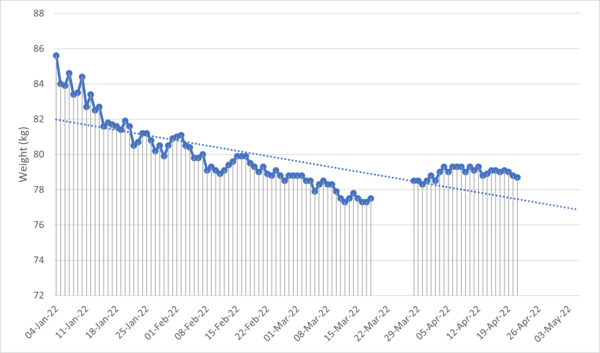How to make happiness last longer and sadness shorter | Just Reflections - Issue #39
Cellphones started getting common when I was in high school. And not so long after, some kids from well up families at school started bringing phones to school. Having a cellphone was a huge social currency. I remember one holiday asking my mother to buy me a cellphone. Thinking about it now. It was a pretty unreasonable request people were selling cattle to buy phones, and she didn’t even have one herself. So she told me I should work hard and one day I’d be able to buy myself one. I was shattered and it stuck with me.
When I started working and could now afford it, I always had the latest phone. I was a big Samsung fan (still am) so I always had the latest S series and galaxy note phone. Sometimes buying it on release week. I was living the dream and I loved it.
I can vividly remember the excitement I’d have when I got a new phone. The day I got it, I’d barely sleep. I’d spend the entire night setting it up. Discovering all the cool new features and moving all my stuff from the old one to the new one (yeah, back in those days it would take the entire night). Getting a new phone brought me such happiness.
I remember another thing distinctly though. The happiness I’d get from getting a new phone wouldn’t last very long. Not long after, I’d get used to it, and it would become just a normal phone. Then I start looking for the next thing.
The hedonic treadmill
The hedonic treadmill sometimes referred to as hedonic adaptation, is the concept that humans will return to a relatively stable level of happiness despite positive or negative events in life that move us up or down from that stable level.
As you would expect, there are some significant advantages and disadvantages that come with our ability to adapt like that. For example, if something very good happens in your life and your lifestyle improves significantly, it’s likely that those increases in your lifestyle that caused a certain amount of happiness to occur will level out. You’ll get used to them and soon they’ll be the new norm and you will return to the same level of happiness that you were at before those things happened. Maybe just a little higher if the thing has some residual lasting happiness.
We can also make the opposite adjustment. If we have a big negative experience. If we receive a pay cut or have to take a job in a location that is not favourable, we will return to the same level of happiness we had before any of that happened at a relatively quick pace. We quickly adjust to the terrible thing and it doesn’t bother us as it did when it first happened. We make adjustments and so we revert to our base level of happiness. And maybe a little lower if the event left some lasting scars.
No big burst of happiness or sadness will veer us off our base level of happiness for too long. In no time we’ll adjust to the new norm and get back to our happiness equilibrium. And we need a bigger event to achieve the same deviation next time.
Why does this matter?
I’m sure you can think of ways relative to how important the hedonic treadmill is. However, it’s more important to make sure that we don’t get stuck on it. Constantly chasing things we feel will make us happy when they really won’t make a difference for that long. Fortunately, there are some ways that we can use the hedonic treadmill to actually become happier and make our lives significantly better.
Distribute the gains
When you happen on some good fortune, maybe you get a new job that comes with a huge raise. Don’t spend it all in one place. Don’t use the extra money now at your disposal on one or two huge purchases. Sure, these will probably give you a big surge of happiness and you’ll feel like a million bucks, but this happiness will only be short-lived. Pretty soon you’ll get used to the new things and they won’t give you as much satisfaction anymore and you’ll revert to your base happiness. Needing even greater stimulation to achieve the same high.
This is one reason winning the lottery usually ruins people’s lives. They massively improve their lifestyle too quickly. Before long, their tastes have adjusted to this more expensive lifestyle and it doesn’t give them as much happiness anymore. They need a bigger fix but the money they have can’t keep pace. Before long the money is gone but the expensive taste remains and it takes far much more to achieve the same high.
All it takes is for you to grab two biscuits instead of one and suddenly two is now your new norm.
You’ll be much happier for much longer if you use your money slowly over time to improve your lifestyle or help others around you do the same. If buying things is how you get your fix, make many smaller purchases over a long period instead of one or two big ones. That way, you have a longer, more sustained happiness. And hopefully, the little bursts will cumulatively leave enough residual happiness to cause an overall boost to your base level.
Rip off the bandaid
If you find yourself with a huge misfortune. Say you lose your job and you can’t afford your current lifestyle anymore. Make the lifestyle changes all at once. Don’t drag it out and make the changes one by one because it will prolong the suffering from that negative lifestyle change.
Do whatever you can to cut as much as you can right away and you’ll still return to a relatively stable level of happiness in a relatively short time.
What we usually do when we realise that we’ll need to make huge lifestyle changes is to change our lifestyle gradually and slowly. But taking it all at once is exactly what we need to do. Since we understand it doesn’t take long to revert to our base level of happiness, it’s better to just make the big lifestyle change in one go, take the big hit all at once and before long you’ll adjust with little lasting impact.
Get off the treadmill
Learn to realise when you have enough. Understand what you need and what you don’t need and focus on being grateful for what you have. Don’t focus on things you don’t have.
Most of us have what we need. If you’re reading this there’s a good chance that you have a place to sleep tonight, you’ll have something to eat during the day. You also have internet access and many other things that many other people don’t have access to. So be grateful for what you have and learn to realise when you have enough. There’s no end to chasing the next thing.
When I think of this I like to think of my younger self being put in my life today. The little boy would be amazed at all the things I now have and take for granted. I do a big disservice to him when I fail to be grateful for the things I have and continuously think that happiness is at the next place.
Practice gratitude daily and you’ll find it a little easier to step off the treadmill.
That’s all I have for you this week. If you like the newsletter, consider sharing it with others on Twitter, WhatsApp or Facebook. Hit the thumbs up or thumbs down below to let me know what you think.
I hope I’ve given you something to think about this week and I wish you ever-increasing curiosity.
Until next week.
BK
2022 Resolutions:
Weight: Get to 75kg by April 28 and 70kg by July
Nothing’s changed here, still spent the week working day and night on dealbase.africa. Tomorrow we open doors to the public then maybe I’ll finally get some time to get back on an exercise routine.
Sleep: Consistently sleep avg. 8 hours per day
Averages this week:
Duration: 8h 4m.
Avg. bedtime: 03:12.
Avg. wake-up time: 10:12.
At least this is something I’m improving on despite everything.
Business: Start a business in 2022
Tomorrow is d-day. I hope you drop by and click around and give us some feedback. Follow dealbase.africa on LinkedIn for updates.
Impactful ideas that challenged my thinking.
I have a lot of interests so I'm always learning all kinds of things, some of which really challenge my thinking. In the Just Reflections newsletter, I'll be sharing with you a summary of the ideas that challenged my thinking recently and hopefully they will challenge yours too and we grow together.
In order to unsubscribe, click here.
If you were forwarded this newsletter and you like it, you can subscribe here.
Powered by Revue







